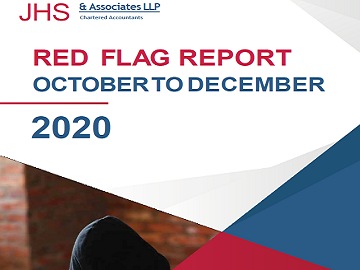Authored by: Huzeifa Unwala, Senior Partner at JHS & Associates LLP
- As the world pauses Auditors continue to Assure
While the world has paused, auditors have continued their auditing duties from the security of their homes. I had the unique privilege of attending my first Audit Committee (in COVID 19 times) of a leading Corporate in India. I must admit the experience was exceptionally good and seamless, the Audit Committee Chair and members were focussed on the auditor’s PowerPoint and the good news is that the facetime of auditors has increased as compared to earlier outings. The Audit Committee started on-time, and there was quality time spent on each key item as there was no rush of agenda items to be completed in a short span of time. Members were relaxed and all ears to the auditors. For a change, the dress code was informal, and there were lighter moments that was an exciting highlight to the otherwise formal environment of the Audit Committee.
- AFH full scope completion a key constraint
In the great lockdown, it is virtually impossible for the auditors and auditees to complete the verification of each and every line item in the scope under audit. It especially applies to those areas where in-person verification is required like say cash counting or examining the signed paper copy of a regulatory filing report that may be locked in the office drawer of the auditee and in such circumstances it may be difficult to retrieve. The auditor has to make appropriate disclosures to those charged with governance responsibilities on the scope line items that are reviewed and ones that cannot be reviewed and their impact (if any) on the internal auditor’s conclusions.
In COVID-19 times, Audit Committees may primarily focus on receiving assurances for statutory compliances and key items such as revenues, assets and liabilities. If the internal auditor is able to complete these critical items, his report may well be accepted.
Pending scope items are part of necessary disclosures that internal auditors have to make so that the Audit Committee Chair can decide on the level of assurance he requires for adopting the financial statements from the internal auditors. If there is a significant pending scope item, that could impact the financial disclosures, and the Audit Chair would demand that the auditee to furnish the necessary evidence and the Audit Committee could be postponed to another date.
- The emergence of a new library of risks and controls
Internal auditors need to prioritise their efforts, considering the current business realities and practical hardships faced by the auditees. However, auditors cannot ignore the real risk of forged documents being submitted by auditees; here internal auditors have to develop auditing techniques for cross-verifying authenticity of scanned images as there may be minimal opportunities to sight the originals in the absence of in-person auditing.
Further, where auditors do not have direct access to production systems of the auditees, it may be possible for the auditee to generate or tamper with system generated reports and supply them to the auditors. To mitigate such risks, the auditor would need to develop additional control testing procedures with respect to all information producing entities to check the integrity and reliability of the information.
While designing and implementing auditing from home scenarios apart from the completing the legal documents such as Audit Charters highlighted in the first article by the author it would be worthwhile for the auditor and auditee to undertake quick information security and cyber risk assessment exercise to ensure that fraud risks are primarily addressed.
- AFH the next practice
The assurance fraternity continues to find innovative ways of making auditing happen in COVID 19 crisis. We may be in phase I of auditing from home scenario; however, within a few months, the maturity level would be at a completely different level. AFH is faster, better and a more efficient way to audit businesses. The total cost of ownership of auditing activities would reduce by implementing the AFH framework. Standard setters and regulators may be compelled to write a new set of relaxations in recognition of auditing from home as the new way of auditing.










